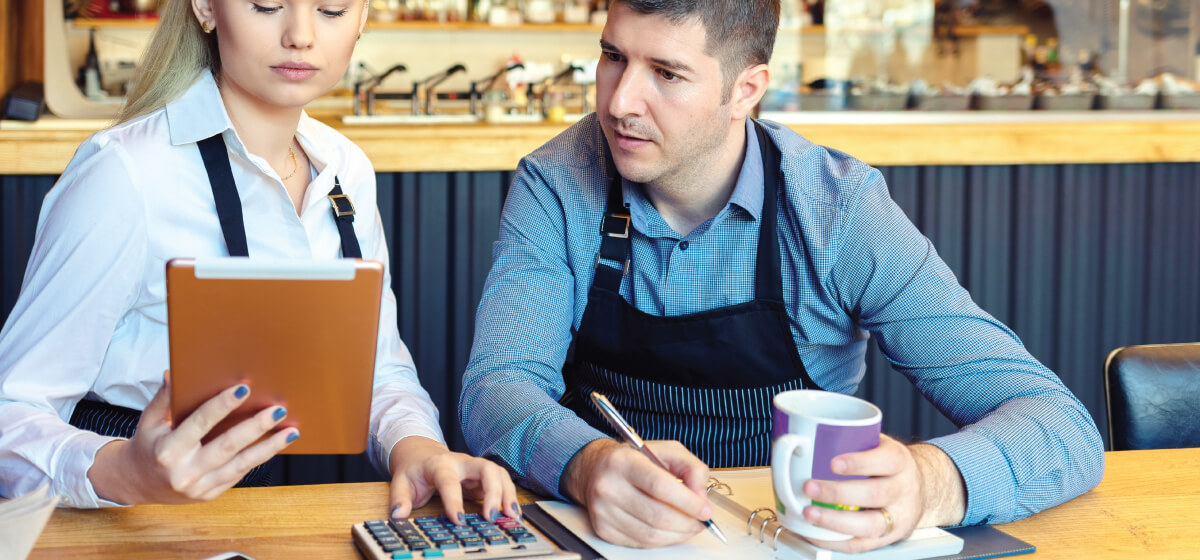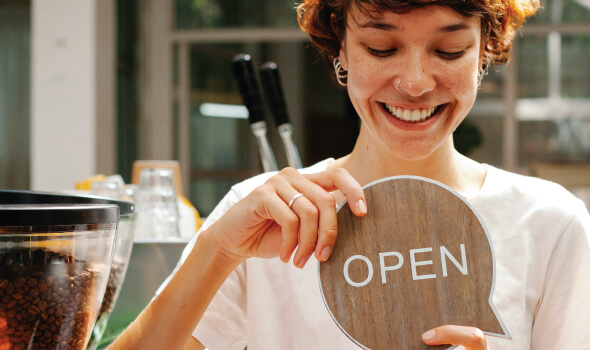Starting a business is an opportunity to become a fixture in your local community. Most of us dream of a successful business, but what doesn’t appear in those dreams is accounting. As dull as it is, knowing and tracking your costs is the most essential key to success.
All businesses come with hidden startup costs, and cafes are no exception. Despite the café market growing by 4.1% last year, with an overall market value growth of 2.2%, it’s not a venture that guarantees success.
With that in mind, we’re going to give you a leg-up on the competition by going through the main hidden startup costs you’re liable to run into.
Average café startup costs
The biggest influence on your overall café startup costs is the lease. Most café owners start with a lease because it’s much cheaper to get started than purchasing a whole building for yourself, especially if this is your first time running a café.
Location is everything to the success of a café because if you’re awkward to get to and nobody knows you exist, people aren’t going to come. The general rule of thumb is that occupancy costs should be no more than 10% of your gross sales.
Other costs can be significant, but stuff like equipment is relatively fixed, so you can factor in the other expenses of starting a café with some confidence. Unfortunately, with lease prices varying so heavily, the average cost of opening your doors varies massively.
Other startup costs you’ll have to factor into your calculations include:
- Utilities
- Equipment
- Interior design
- Marketing
- Startup loans
- Technology
- Food costs (if relevant)
- Staffing
With all this in mind, it can feel overwhelming, but what does it all add up to? According to one study, you can expect to spend anywhere from £20,000 to £100,000. Coffee stands can be much cheaper, with as little as £7,500 needed to start.
Start your Cafe Business Journey Today
Hidden café startup expenses
Experienced entrepreneurs can anticipate most expenses, including equipment, licensing and other compliance costs, but most people forget about the hidden one-time expenses for getting a café off the ground.
If you want to keep your café dreams percolating, certain costs must be included in your business plan to avoid starting with a lack of capital from day one. Here’s a breakdown of the five most common hidden costs that often go overlooked.
Professional fees
Signing a lease or buying a building all come with fees. Expect to have a solicitor by your side to sort through the agreements and provide legal advice to ensure you don’t get ripped off. This could add up to a few hundred pounds, depending on how complicated your situation is.
Another professional you might have to employ is an accountant to handle your books and keep up with your tax affairs. Still, some café owners hire business advisors initially to see them through those turbulent first months.
Insurance
Insurance is a must-have for any business, or you’re leaving its long-term prospects to chance. Uninsured businesses risk losing everything if their building burns down or a customer trips and falls on the premises. Additionally, don’t forget that insurance is a condition for nearly all loans.
Examples of insurance you’ll need before you serve your first cup of coffee include:
- Property insurance
- Employer’s liability
- Public liability
Expect to spend up to a grand each year on insurance, but your costs can go up further if you take out more comprehensive policies (strongly recommended).
Marketing costs
The idea that if you build it, they’ll come is simply false. With the UK population drinking 98 million cups of coffee each day, you’re already snowed under with competition in any town centre in the country.
Initial marketing efforts must be factored into your budget long before you celebrate your grand opening. Think about the cost of starting a website, external signage and any leaflets and business cards you want to distribute around your local community.
Don’t make the mistake of turning to marketing only after you open, or you’ll lose out on that initial momentum.
Working capital
One of the biggest mistakes entrepreneurs make in their business plans is ignoring their monthly ongoing expenses. They don’t account for the initial working capital needed to survive before their business gets up to speed.
Some of the biggest operating expenses you’ll have to cover initially include:
- Rent
- Utilities
- Wages
Remember, most cafes don’t start with a bang. It can take up to a year before you’re generating enough revenue. Without that working capital buffer, you risk a serious cash flow problem during those initial growth periods.
Initial stock
Your first investment in all the stock and supplies you’ll need to run your business usually costs far more than a normal month. Why? Most cafes don’t wait until they’re completely out of stock before ordering more.
Check that you have a substantial cash reserve to cover those initial purchases, including ingredients for making food and coffee beans.

Tips to reduce startup costs for a café business
Startup costs for cafes often surprise aspiring entrepreneurs, especially in locations like London, Birmingham and Manchester. So, how can you reduce your startup costs and free up some additional funds?
- Rent a Café – Don’t build your own café. Rent someone else’s. When you take over an existing café or cafe franchise, you don’t have to worry about renovations or remodelling. Plus, it’ll reduce your preparation time.
- Start Small – Begin by starting in a small way. Don’t feel like you need a café with 100 seats to begin. Focus on building a base and then gradually expanding.
- Keep a Limited Menu – The larger your menu, the more it’s going to cost in terms of ingredients and capital. Start with a simple menu to reduce wastage and gradually try out new things to find what works best.
- Buy Used – Explore the second-hand market for coffee and kitchen equipment. The same goes for furniture. Much of what you’ll find needs some minor TLC, but it could save you thousands.
- Outsource – It’s not required to do everything in-house. Consider partnering with a supplier who can make regular deliveries. For example, if you want baked goods, you’ll need the kitchen setup, inventory and appliances. This costs tens of thousands of pounds, whereas you could support another local business and still expand your menu.
Anything you save when getting started snowballs into more financial power to keep your café afloat and expanding later. At Cogogo, we have an array of café businesses for sale, allowing you to jump right in without spending more than you need to. Check out our latest listings and make your café dream come true today.

